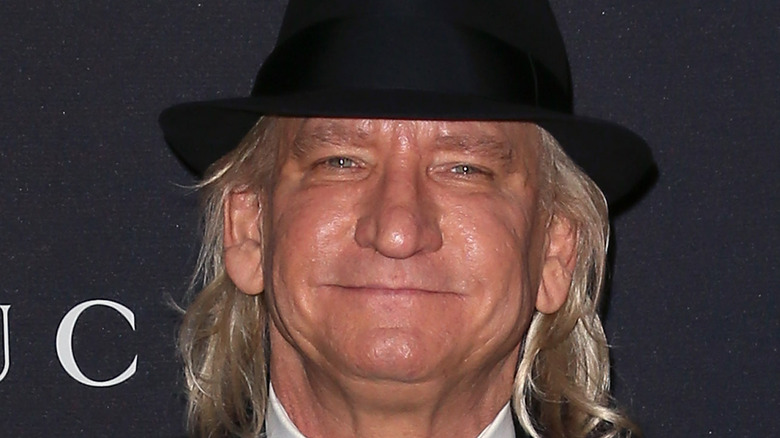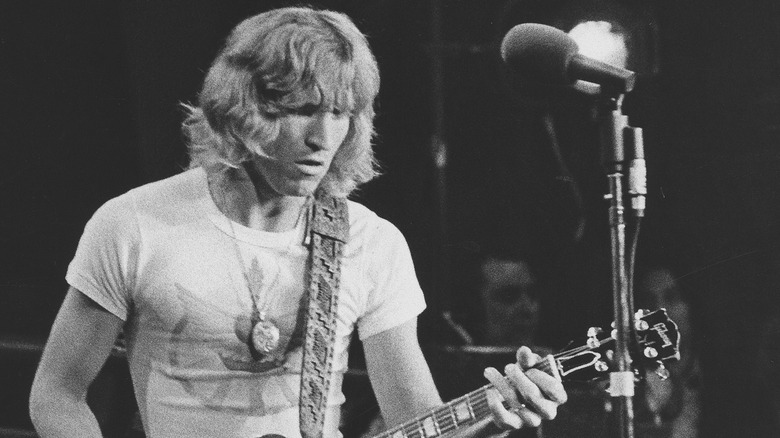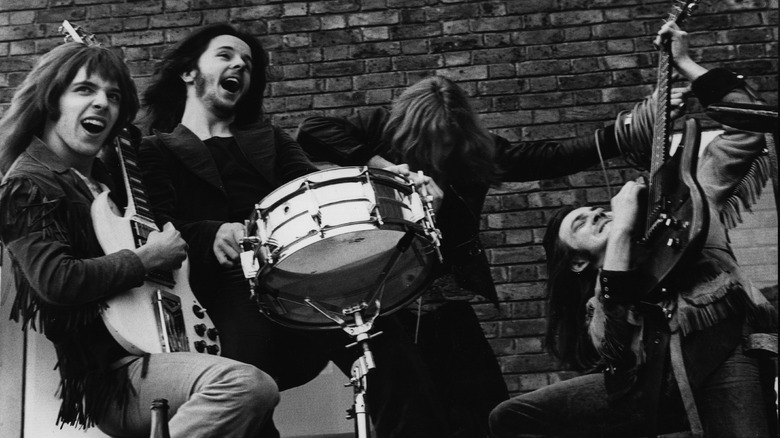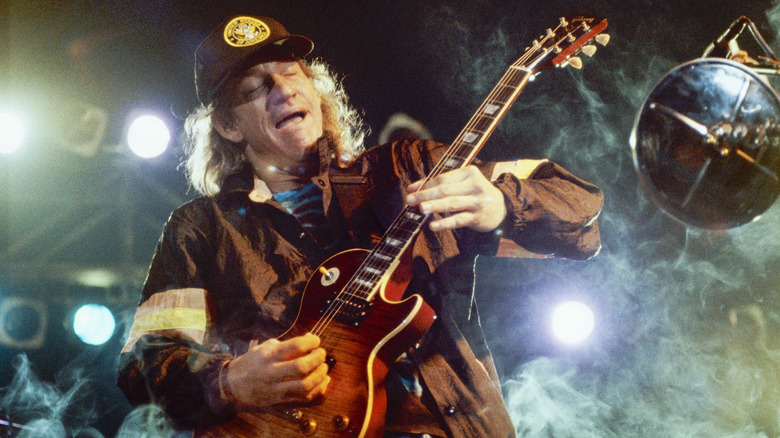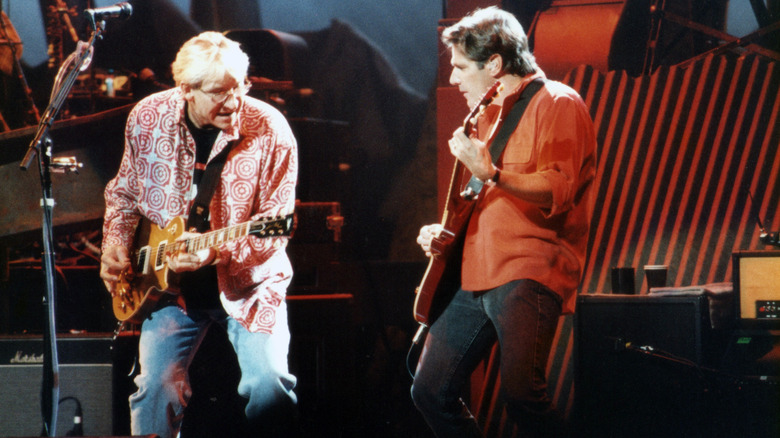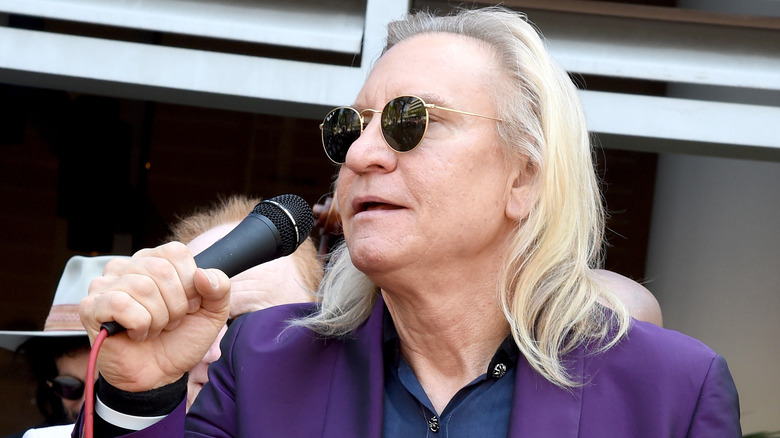The Untold Truth Of Joe Walsh
He was the man who sang and played guitar for the James Gang on classic rock staples such as "Walk Away" and "Funk #49." A few years later, he gave the Eagles a harder rock edge after replacing founding guitarist Bernie Leadon, and promptly delivered through his work on the albums "Hotel California" and "The Long Run." He's also the guy who cranked out solo hits like "Rocky Mountain Way" and "Life's Been Good" in between those endeavors. Regardless of how you may remember him best, Joe Walsh has had a fascinating, long-running career as a musician that continues to this day, and that doesn't count the multiple times he (half-jokingly) ran for political office (via Live Science), pushing platforms that showcased his goofy sense of humor and rock 'n' roll spirit.
Born on November 20, 1947, Walsh grew up in a musical family and spent much of his childhood moving from city to city, as noted in his website's biography page. Like many rock stars in the making, he got his start playing covers of popular songs in a high school garage band, and just a few years later, he was on his way to stardom after joining the James Gang. But while one can add that he joined the Eagles years later and the rest is history, there's far more to Walsh's life than stints with two legendary bands and a similarly successful solo career. Read on for the untold truth of Joe Walsh.
He was part of a 'band' that had a Top 40 hit in 1967
Notice the quotes above, and take note that we're not referring to the James Gang, which would come a few years later. Back in the mid-'60s, the Measles (we're guessing they chose the name because it rhymes with "Beatles") was a band of Kent State University students that featured Joe Walsh on vocals and guitar. After developing a reputation in the area as an up-and-coming bar band, they started working on original songs, including the Walsh-penned "I Find I Think of You" and "And It's True," the latter of which was composed by bassist Bobby Sepulveda, according to Buckeye Beat.
What makes this interesting is the fact that those two songs appeared on the Ohio Express' 1967 debut album "Beg, Borrow and Steal," whose title track peaked at No. 29 on the Billboard Hot 100 that same year, per Songfacts. The Ohio Express was not as much a traditional band as it was the name producers Jerry Kasenetz and Jeff Katz used for the songs they released from various bands and musicians, the Measles included. In fact, the song "Beg, Borrow and Steal" was actually performed by a group called the Rare Breed, while Kasenetz and Katz had a totally different band go on tour as the Ohio Express and record at least some of the other songs on the album.
The Ohio Express' history is a confusing one, to be sure, but for a brief moment, that history included a future guitar legend and one of his first-ever compositions.
Walsh nearly joined another successful band before the Eagles
As noted by Rolling Stone in 1975 (via The Uncool), Joe Walsh moved to Boulder, Colorado, after falling out with the James Gang in 1971 over creative issues. There, he formed a group called Barnstorm, which backed him up on his solo releases. But before that, he had an opportunity to play for another high-profile act, as British band Humble Pie was seeking a replacement for guitarist Peter Frampton (that's him on the extreme left), who had recently departed to kick off what would become a mega-successful solo career. Walsh turned down the offer and headed to Boulder instead, where he dealt with his exit from the James Gang and accusations that he left the band so he could "[dry] out" from a heroin addiction, which he denied.
Walsh wasn't the only American guitarist who was being targeted as Frampton's replacement. According to "Steve Marriott: All Too Beautiful," the 2004 biography of Humble Pie's late frontman, the band was also interested in the services of Rick Derringer, previously with the McCoys (of "Hang On Sloopy" fame) and at that time hoping to make it big as a solo act — he later did, thanks to his 1973 single "Rock and Roll, Hoochie Koo." Instead of Walsh and Derringer, Humble Pie ended up hiring another British musician — Clem Clempson, who was then playing guitar for prog-rock band Colosseum.
Joe Walsh had a (very) short-lived supergroup in 1990
In the annals of rock music history, there have been scores of supergroups formed by members of already well-established bands. Some of these acts, such as Cream, end up creating unforgettable tunes and certified chart hits. Other supergroups — again, using Cream as an example — burn out after just a few years when it becomes obvious they simply can't get along. Joe Walsh's early-'90s supergroup never had any big hits (or original songs, for that matter) nor did they fall apart due to one epic beef or another. In fact, they only lasted a few weeks before going their separate ways.
As recalled by Rolling Stone, the band was simply known as the Best, and it featured Walsh and Jeff "Skunk" Baxter (Steely Dan, Doobie Brothers) on guitars, John Entwistle (The Who) on bass, Keith Emerson (Emerson, Lake & Palmer) on keyboards, Simon Phillips (Judas Priest, The Who, Toto, etc.) on drums, and session musician Rick Livingstone on vocals. The band played a series of dates in Japan in September 1990, and they specialized in covers of tracks from the bands that made each instrumentalist famous, including, but not limited to the Eagles' "Life in the Fast Lane," Steely Dan's "Reelin' in the Years," and ELP's adaptation of Aaron Copland's "Fanfare for the Common Man."
Commenting on the Best's live act, Rolling Stone opined that Livingstone — by far the least-known member — was the "only weak link" in the supergroup. However, the publication also argued that "asking anyone to be Don Henley, Roger Daltrey, Donald Fagen, and Greg Lake all at once is just too much." Fair point indeed.
The Eagles' 1994 reunion might have 'saved' Walsh from addiction
When Joe Walsh joined the Eagles in 1975, there were concerns that the hard-partying axeman might be "too wild" for the peaceful, easy country-rockers (via Society of Rock). On the plus side, Walsh was as good as advertised, helping the Eagles rock harder. But on the negative side, the aforementioned concerns turned out to be valid ones, as the guitarist's penchant for hotel room destruction, among other shenanigans, got the Eagles banned from many a venue. Decades later, he told the Daily Mail that he was such a wild man because he was insecure being in the same band as Glenn Frey and Don Henley — two brilliant singer-songwriters and instrumentalists who wrote and sang lead vocals on most of the Eagles' songs.
After the Eagles disbanded in 1980, Walsh entered a period in which his drug and alcohol consumption reached dangerous levels. He even entered a relationship with Fleetwood Mac frontwoman Stevie Nicks where, as she recalled, they did "way too much drugs" before ultimately breaking up. And it was only when the Eagles reformed in 1994 that Walsh got the motivation to sober up once and for all. "He looked so bad," recalled bassist Timothy B. Schmit. "I think the offer to rejoin the band saved him." Fortunately, Walsh has remained clean and sober in the decades since, as confirmed last year on the First Step to Recovery Treatment Center's website.
Walsh is no stranger to personal tragedy
Joe Walsh may be the "Clown Prince of Rock," but his life has also been marked by multiple challenges and tragedies. Aside from dealing with the death of his biological father Robert Fidler when Joe wasn't even 2 years old, the would-be rock star felt "stupid and alone" as a young boy with attention-deficit disorder, obsessive-compulsive disorder, and Asperger's syndrome (via First Step to Recovery). Playing guitar allowed him to make good use of his talents, but he struggled with substance abuse for years as he became a "godless, hateful thing" during the lowest points of his life.
In 1974, Walsh was greatly affected by the death of his 3-year-old daughter Emma, who was killed in a car crash while the musician's then-wife, Stefany Rhodes, was driving the young girl to a playdate. Walsh channeled his grief through his music, releasing the uncharacteristically dark and serious solo album "So What" in December 1974, though Emma's death proved to be the catalyst for his eventual divorce from Rhodes, according to Ultimate Classic Rock.
Walsh was rocked by yet another tragedy in 1996 when his sister-in-law, freelance journalist Susan Walsh, went missing. As reported by NorthJersey.com, Susan used her past experience as an exotic dancer to write articles about the Russian mob's sex-trafficking operations, and she also did pieces on the various subcultures in and around the 1980s and 1990s club scene. It has been theorized that she might have been kidnapped by someone from one of those subcultures, or "silenced" by the mob as retribution for one of her exposes.
